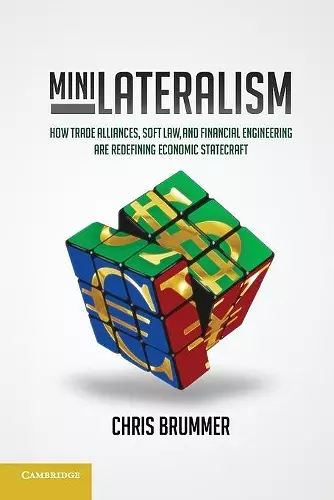Minilateralism
How Trade Alliances, Soft Law and Financial Engineering are Redefining Economic Statecraft
Format:Paperback
Publisher:Cambridge University Press
Published:7th Apr '14
Currently unavailable, and unfortunately no date known when it will be back
This paperback is available in another edition too:
- Hardback£68.00was £68.00(9781107053144)

This insightful exploration of minilateral strategies reveals how Minilateralism is reshaping global diplomacy and economic relations among countries.
In Minilateralism, the author delves into the evolving landscape of global diplomacy, emphasizing the shift from traditional multilateral approaches to more flexible minilateral strategies. As the world becomes increasingly interconnected yet fragmented, countries are finding that smaller, targeted alliances and agreements can yield more effective results than the cumbersome multilateral frameworks of the past. This book outlines the various forms of minilateralism, including trade partnerships, informal agreements, and innovative financial strategies that allow nations to navigate complex economic relationships with greater agility.
The author discusses the implications of this shift for international relations, highlighting how minilateralism enables countries to pursue their interests in a rapidly changing global environment. By focusing on cooperation among a select group of nations, these strategies can address specific issues more efficiently, fostering collaboration where broader agreements have stalled. Minilateralism illustrates the practical applications of these approaches and provides case studies that showcase their effectiveness in real-world scenarios.
Ultimately, Minilateralism serves as a comprehensive guide to understanding this new diplomatic toolbox. It explores the challenges and opportunities that arise from this trend, offering insights into how nations can adapt and thrive in a post-American and post-Western world. The book is essential reading for policymakers, diplomats, and anyone interested in the future of economic diplomacy and international relations.
'Chris Brummer's core message is that multilateralism is giving way to minilateralism. As the era of American hegemony draws to a close and as the institutions that once dominated the multilateral era (the WTO, the World Bank and the IMF) find themselves constrained by a more complex environment, new institutions and smaller networks are developing, much as the first small, furry mammals quietly appeared at the end of the Age of Dinosaurs. Brummer incisively connects the dots between financial, trade and monetary regulation, charting the growth of these new bodies … This is an eye-opening and elegantly written tour, as history and economics interact, new institutions evolve, and soft law seeks to hold the new networks together.' John C. Coffee, Jr, Adolf A. Berle Professor of Law and Director, Center on Corporate Governance, Columbia Law School
'Chris Brummer has brought several seemingly disparate trends in the global financial system together under the useful umbrella of minilateralism. In doing so, his lively and engaging writing style gives life to the details of global governance and financial engineering. Most importantly, however, instead of just celebrating the new status quo, he identifies minilateralism as a response to globalization that when improperly managed can create as many problems as it solves.' Anne-Marie Slaughter, President and CEO, New America; and Bert G. Kerstetter '66 University Professor of Politics and International Affairs, Princeton University
'Professor Brummer ably captures the recent evolution from standard-setting and consensus building via large, multilateral institutions promoting universalist principles, to norms established via smaller coalitions focused on addressing the particularist needs of like-minded partners. Few books tackle so many topics so clearly and elegantly, and bundle them into one compelling narrative. Moving from the regulation of coins in medieval Europe to today's international money supply and the rise of the Chinese RMB, and from Venetian trade strategy to today's WTO, Minilateralism offers a compelling history and theory of how economic diplomacy works. For standard-setters looking to understand their role in the global economy, a must read from a top expert in the field.' Ethiopis Tafara, Vice President and General Counsel, International Finance Corporation, World Bank Group
ISBN: 9781107678569
Dimensions: 227mm x 152mm x 14mm
Weight: 380g
224 pages